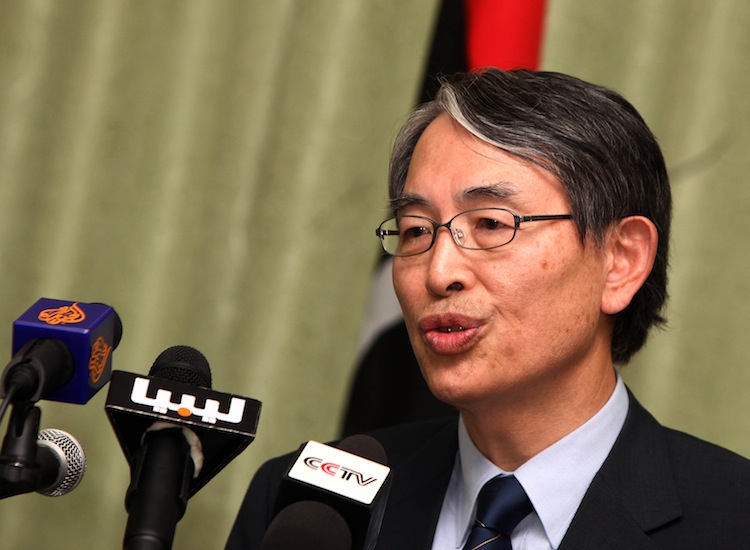
Ten years after its foundation, the International Criminal Court (ICC) continues to make headlines with judgements on those accused of some of the most heinous crimes around the world. Judge Sang-Hyun Song, president of the ICC, wrote an article in November outlining his belief in how the court empowers victims and deters new tragedies. In an interview with Daily News Egypt, Judge Song talks about the role of the ICC in the Middle East and responds to criticisms about the effectiveness of the court’s work.
Seif Al-Islam Gaddafi may be tried in Libya, despite the ICC wanting to try him in The Hague. Past attempts to try high-profile suspects have led to nothing because the ICC cannot extradite these people. How can the ICC function properly when those accused of the most heinous crimes and within positions of great power are completely immune from their requests? Also, by releasing an arrest warrant for Gaddafi did the ICC risk making him more unwilling to step down and escalated the conflict?
The ICC is first and foremost a court of last resort. One of our most important principles is that of complementarity, which means that the ICC complements, rather than substitutes, domestic courts. A case would only come before the ICC if the national jurisdiction in question is not genuinely investigating or prosecuting the crime itself. Indeed, the national courts have priority over ICC proceedings. As such, it is never the issue that the ICC “wants to” prosecute and try someone, but rather that the ICC has the mandate to do so when national jurisdictions are not acting.
In this particular instance, the Libya situation was referred to the ICC by the United Nations Security Council (UNSC). This is the only way in which a state, not party to the Rome Statute of ICC, such as Libya, may be subjected to the ICC’s jurisdiction. The Libyan authorities have submitted a request to the ICC’s judges to stop the ICC case against Saif Al-Islam Gaddafi, arguing that they want to try him in Libya. This matter is now being considered by the judges, and if Libya can show that it is able and willing to genuinely prosecute Mr. Gaddafi, it will be allowed to do so.
The ICC is also very active in trying to ensure that arrest warrants are successfully carried out, and I would point out that 15 suspects so far have appeared before the ICC’s judges to face allegations against them. Some of them were arrested by national authorities and transferred to the ICC, some came voluntarily. While the ICC does face outstanding arrest warrants, let me stress that they have no temporal limitation. This means that the suspects’ movements will be constrained as long as they are at large. For instance, the ad hoc UN tribunal for the former Yugoslavia faced the same problem of non-executed arrest warrants for many years, but in the end all their suspects were brought before the tribunal and none remain at large. I am confident that all outstanding ICC warrants will likewise be executed, sooner or later.
As for the last part of your question regarding the ICC’s impact on the conflict in Libya, as a purely judicial body, the ICC has no mandate to consider political consequences of its work. 121 states parties to the Rome Statute as well as the United Nations Security Council have entrusted the ICC with a judicial mandate, and that is what we focus on. Because of the ICC, all those who consider perpetrating heinous crimes will now think twice before doing so. They know that they may be brought before the ICC to face the consequences of their actions.
Radwan Ziadeh and the Damascus Center for Human Rights Studies was in the Hague earlier this month trying to bring a case against Bashar Al-Assad to the ICC. Is this an isolated incident? Can the ICC play a role in the Syrian conflict?
Reports about grave crimes committed anywhere are naturally of concern to the international community. However, the ICC can intervene only in accordance with the rules governing its jurisdiction. Syria is not a state party to the Rome Statute of the ICC. Therefore, the only way in which the ICC could intervene in Syria is if the United Nations Security Council refers the situation to the ICC Prosecutor, as it was the case with Libya and Darfur (Sudan).
Does Laurent Gbagbo’s arrest set a precedent that means more heads of state will face ICC trial? Does the ICC have jurisdiction over sitting heads of state?
According to article 27 of the ICC’s founding treaty, the Rome Statute, the ICC’s jurisdiction applies equally to all persons without any distinction based on official capacity. Thus, the ICC does have jurisdiction over sitting heads of state. Indeed, anyone who is suspected of having committed atrocity crimes is liable for prosecution within the ICC, if judges find that there is sufficient evidence to justify that. Indeed, it is now an established principle of international law that an official function cannot give anyone the right to commit grave crimes with impunity.
That said, it is important to note that Mr. Gbagbo, like everyone else who is arrested and brought to appear before the ICC, enjoys the presumption of innocence. ICC suspects can be found guilty of the alleged crimes only if the prosecution can prove their individual guilt beyond a reasonable doubt.
Is there a way to force all non-ratifying states to sign and ratify the Rome Statute? If not, do you believe the ICC can be fully effective as long as some state leaders can get away with crimes they have committed only because they chose not to ratify the statute?
No one can force a sovereign state to ratify a treaty; that would go against the very foundations of international law and the concept of state sovereignty. Ratification of the Rome Statute, as with any other multilateral treaty, is a sovereign decision for each country to make. What we nonetheless, can do, is raise awareness about the ICC’s mandate and judicial activities, which can facilitate informed discussions on the prospects of ratifying the Rome Statute in various countries.
Despite the fact that a number of countries have not yet ratified the Rome Statute, the ICC has proven to be effective. Not only is the ICC a fully functioning permanent international court, it is also the centrepiece of a completely new international justice paradigm, in which 121 States so far have decided to strengthen their national capacity to prosecute atrocity crimes with an international court of last resort. The increasing number of cases at the ICC and the growing international support for its work are evidence that the ICC is doing well and is here to stay.
Finally, let me point out that state leaders of non-state parties are not immune to the ICC’s jurisdiction if they commit Rome Statute crimes on a state party’s territory. For instance if Egypt were to ratify the Rome Statute, anyone – regardless of their nationality – committing crimes against humanity on Egyptian soil could face charges at the ICC.

What is the legal procedure expected to happen to someone who has been indicted by the ICC should they be, in fact, arrested?
The ICC guarantees all defendants a fair hearing conducted impartially. Throughout the proceedings, each defendant is presumed innocent and has the right to professional legal assistance, which will be paid for by the ICC if the defendant cannot afford it.
Once a suspect has been brought under the ICC’s custody, he or she is first brought before a Pre-Trial Chamber, which will give the suspect the opportunity to hear and to contest the allegations against him or her. Only if the judges consider that there is sufficient evidence to establish substantial grounds to believe that the person has committed the crimes he or she has been accused of, the charges will be confirmed and the case will proceed to trial. Thus far, this has occurred in relation to ten persons, whereas in the case of four suspects, the ICC’s judges found the prosecutor’s evidence not to be sufficient to justify a trial, and the proceedings against these persons were discontinued.
At trial, the judges will hear witnesses and evidence presented by each party, prosecution and the defense. If the evidence shows beyond reasonable doubt that the accused is guilty, he will be convicted and sentenced. The Trial Chamber may also order reparations for victims. The verdict, sentence and reparations decision can be appealed before an appeals chamber of five judges, which is currently the situation in the case of Mr. Thomas Lubanga Dyilo.
Is there a proposed way to work around an ICC criminal whose country hasn’t ratified the statute and only visits states who hasn’t ratified it, for example Al-Bashir?
I would like to stress again that every suspect and accused before the ICC is presumed innocent until proven guilty and therefore should not be considered a “criminal” unless convicted by final judgement. With almost two thirds of the world’s countries already part of the ICC system, the opportunity for an accused to travel is very limited. As more states join the Rome Statute community, the space for impunity steadily reduces.
It is also important to note that nothing prevents a non-state party from arresting a suspect and transferring him or her to the ICC. Indeed, many states may choose to do so in order to ensure that those suspected of being responsible for grave crimes such as genocide face the allegations against them in a court of law. Therefore, if a suspect chooses to travel to a non-state party he or she still risks arrest.
In fact, with regard to Darfur and Libya, the UN Security Council urged all UN member states to cooperate with the ICC. As such, an ICC suspect may be arrested anywhere in the world.
What kind of effort is being exerted to try and get every state to sign and ratify the Rome Statute? Is there an expected time-frame after which the whole world would be a signatory of the Rome Statute?
Part of my own mandate as president of the ICC is to raise awareness about the mandate of the ICC and the goals of the Rome Statute, the benefits of ratifying the Rome Statute. This is done by giving interviews, meeting with state representatives, travelling to non-member states and, taking advantage of public platforms to spread information about the ICC. Numerous state delegations, including those from states not party to the Rome Statute, visit the ICC and are briefed on the function and purpose of the Court.
What I always underline is the legal protection that the Rome Statute provides against terrible crimes such as mass murder, deportation, torture, enforced disappearances and sexual violence. Once a country joins the Rome Statute, anyone committing such crimes on its territory would risk prosecution before the ICC.
Unless a country has previously made a declaration accepting the ICC’s jurisdiction, the Rome Statute’s protective impact only starts from the day the country becomes an ICC State Party. This is good reason to join sooner rather than later.
Another good reason to join is to be able to participate in shaping the ICC’s development together with all other state parties, for instance by proposing amendments to the ICC’s legal texts or by putting forward candidates for the elections of judges, prosecutor or deputy-prosecutor. Egypt has produced many superb international lawyers and would no doubt be a most valuable addition to the ICC’s membership.
The ICC belongs to people everywhere, on each continent, and I would like to see all nations take active part in shaping the ICC’s future so that this evolving system of international criminal law can be as representative as possible.
International criminal justice is a rapidly developing area. With 121 states parties in just 10 years, my sincere hope is to see all nations come under the umbrella protection of the ICC within my lifetime.
What do you have to say to those who describe the ICC as a “useless” body?
I think that the thousands of victims who participate in the ICC’s proceedings would disagree with that characterisation; or the 80,000 victims in Africa who benefit from the assistance programmes of the ICC’s Trust Fund for Victims, or the African States, Mali, Côte d’Ivoire, Central African Republic, Uganda, and the Democratic Republic of the Congo, that called for the ICC’s involvement in their countries; or the United Nations Security Council, which referred the situations in Darfur and Libya to the ICC, the latter with a unanimous vote. As you can see, there is a need for the ICC, and victims, states and the international community have placed their confidence in it.
The ICC’s landmark cases featuring charges of the enlistment, conscription and use of child soldiers, have already had a tangible effect, as countries such as Yemen and Nepal have committed to stopping these deplorable practices.
With sixteen court cases stemming from seven country situations, the ICC’s activities are having a tremendous impact not just on individuals prosecuted before the Court, but also on the tens of thousands of direct victims, millions of people in the affected communities and societies, and indeed several billion people under the legal protection of the Rome Statute system.
With this in mind, I urge Egypt to consider ratifying to the Rome Statute. It would not only protect Egypt’s own population, but also strengthen the battle against impunity worldwide. Global concerns require global solutions. Egypt, with its leading role in the region and a strong legal tradition, would make a vital contribution to the common international efforts to prevent impunity and to promote justice for all.




